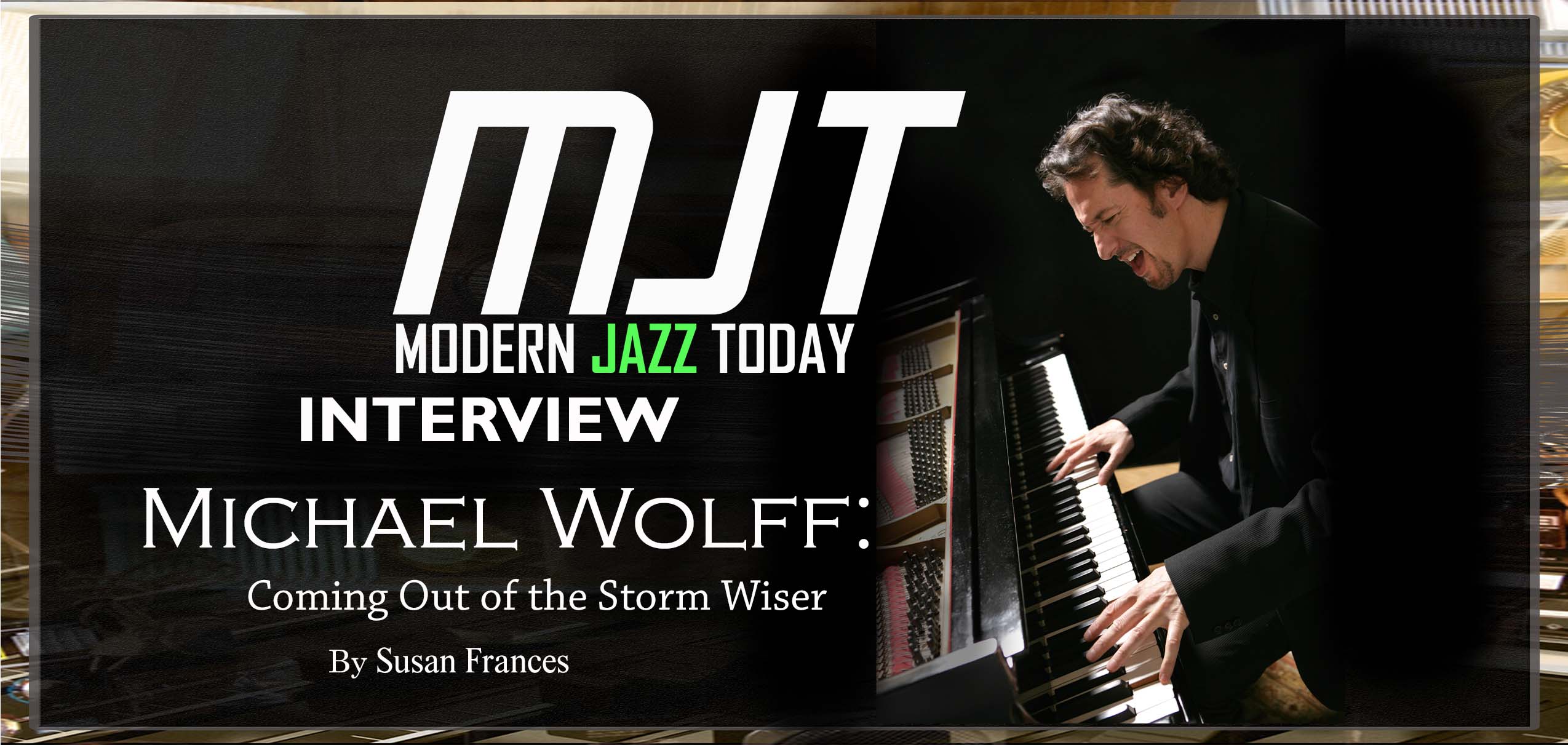Michael Wolff: Coming Out of the Storm Wiser

When Wolff was diagnosed with a rare cancer in 2015, his life took an unexpected turn, forcing him into a storm like none he had ever experienced. Entering into 2022, he is entirely free of cancer and cancer medications. Coming out of the storm, Wolff underwent a metamorphosis, strengthening his appreciation for his life and finding a new level of wisdom that he had not tapped into previously.
Wolff’s latest offering, Live at Vitello’s, was released in 2021 by Sunnyside Records, a label that he assures shares his values. “I love
“Francois has been very supportive of me as an artist,” he attests. “I’ve loved recording with the other labels I’ve been with, but these days Sunnyside is the best fit for me and my music.”
Wolff applied the same criteria when choosing the musicians performing with him at Vitello’s in Los Angeles, California, for the live recording. He wanted musicians who would best fit him and his music. Accompanying him are Mark Isham on trumpet, John B. Williams on bass, and Mike Clark on drums.
Wolff recalls, “I met drummer Mike Clark when I was a teenager in the San Francisco Bay Area. I was seventeen, and he was a few years older. I was the house pianist at the Sunday afternoon jam session at the Both/And club. The band was led by Bishop Norman Williams, and we had August Lee Collins on drums and either Ray Drummond or Steve Turre on bass.”
“Mike and I checked each other out for a while,” he remembers, “before we got the chance to play together at some jam sessions. When I was 22 years old in 1975 and playing with Cannonball Adderley, Mike was playing with Herbie Hancock and The Headhunters. I went to his first gig with Herbie at Keystone Berkeley. His playing blew me away. He had created a new style of drumming, combing the freedom and excitement of improvisational jazz with the dance grooves of Oakland funk. We began playing together frequently when Mike moved to New York in the 80s. We formed a trio with bassist John Burr and played all over New York as a trio and backing up various singers and horn players.”

In the wake of his battle with cancer, Wolff demonstrates sharp instincts, driven by a wisdom he is learning to trust. A wisdom that led him to reach out to two dear friends to accompany him on the live recording.
“I’ve been playing with both bassist John B. Williams and drummer Mike Clark for many, many years,” he enlightens, “and love the way they play together. John lays the beat down on his bass, rooted into the center of the earth, and Mike dances and darts and feints on the drums.”
“When I recorded Live at Vitello’s,” he broaches, “I decided I wanted to record with Mark Isham on trumpet. Mark is one of the greatest musicians I know. He is very successful as a film composer. I met him when we were teenagers, and he was playing amazing jazz trumpet. He approaches all music with his own point of view, and we are both huge fans of Miles Davis and keyboardist Joe Zawinul. I knew he would be perfect for this music.”
The live recording features Wolff’s reimagination of “Nefertitti” by Miles Davis. He describes, “I recorded ‘Nefertitti’ for the second
He recounts, “I first heard this song when I was in high school, and my friend Mark Steidel bought the record by Miles Davis. We had a band, and all of us got together to listen to this music. We couldn’t understand the complexity and magic of the music, but I knew this was what I wanted to play, and I worked to understand it over the years.”
Another track that Wolff chose for the live recording is his own original composition, “Lagniappe.” The term lagniappe is rooted in the New Orleans culture, referring to an act by merchants to give their patrons a little something extra with each purchase.
Wolff recollects, “I wrote ‘Lagniappe’ to be a fast-swinging song. I don’t remember what inspired it.”
“For this band,” he considers, “I wrote out the melody in the trumpet part and the bass part for John B. Williams and gave the bass part to Mike Clark. They all instantly knew what to play on this piece. Being from New Orleans, I knew ‘Lagniappe’ is a little something extra, a treat, like the thirteenth donut in a box of a dozen donuts.”
From the slow, bluesy swells of “Ballade Noir” to the funky grooves of “Falling Down,” the reflective phrasing of “The Conversation,” and the dynamic shifts of “Lagniappe,” the live recording intimates passionate feelings. Live at Vitello’s sees Wolff out of the storm, while his previous releases, SWIRL in 2019 and Bounce in 2020, both from Sunnyside Records, saw him in the aftermath of his battle with signs of his struggle lingering.
“Sunnyside put out my album SWIRL,” he notes, “and it went to number 1 on jazz radio. We then released Bounce, and it went to the top ten on jazz radio. When radio people and musicians, and audiences see a record is on Sunnyside, they make sure to give it a real listen. They know Francois is a true music man.”
For SWIRL, Wolff discovered an appreciation for his heritage, descending from a population of European Jews commonly known as Ashkenazi. His lineage inspired the track “Tough Ashkenazi,” which he explains, “I wrote the song ‘Tough Ashkenazi’ after I played my first gig back after being sick with cancer and laid up for four years. It was a duo gig at Mezzrow in New York City with bassist Ben Allison.”

Wolff’s foray into writing his own compositions can be traced back to his youth. “I began making up my own music when I was a young boy,” he cites. “When I was 12 years old, I had a great piano teacher named Florence Bardell who made a deal with me. She said if I played the classical music she wanted me to play, in each lesson, we could play one Beatles tune and one of my own compositions. So, I began composing every week.”
“I have never stopped composing music,” he asserts, “whether songs with lyrics, jazz tunes, orchestra music, big band music, film scores, music for theater, music for string quartet. I love to compose. I still write on big score paper with a pencil.”
His exposure to jazz music started earlier, as he shares, “When I was four years old, my father had an old upright piano that belonged to my grandmother moved from her house in Covington, Louisiana, to our house in Memphis. I loved sitting down at that piano and touching the keys and pushing them down and hearing the sounds.”
“My father was an amateur musician who loved jazz,” he proclaims. “He would sit me on his lap while he rocked on his rocking chair, smoking a pipe and holding his nine iron, while he listened to records of Count Basie, George Shearing, Ray Charles, Oscar Peterson, and others. He would actually point out to me the sections of the music and what was happening in the different instruments.”
“I like so many pianists,” he vows. “My favorite jazz pianist is Herbie Hancock. I love his feel and the sound he gets on the piano, as well as his harmonic approach and his compositions. He is bluesy and modern simultaneously.”
He elaborates further, “Other pianists I loved growing up were McCoy Tyner, Chick Corea, Bill Evans, and Keith Jarrett. When I
“I think my approach to recording has changed over the years,” he observes. “When I made my first record, I wasn’t sure I’d ever have another chance to record again, so I put everything in it I could think of. Many different styles of music that I liked at the time. Some straight-ahead jazz, fusion, hip hop, ballads.”
“Now, when I record,” he discerns, “I hope to create a singular mood for each project. It doesn’t mean I’ll do all ballads or all fast songs, but I try to have the musical and soulful/spiritual thread express my point of view at that time. I have been fortunate to record so much and to have been able to imprint what I’ve been into at the time in a permanent way.”
His lengthy catalog of material to draw from when performing live has not been an obstacle. He maintains, “When I perform, I play the music that interests me in the moment. I do look back on earlier material I have composed or songs of other people I have arranged, and that means something to me. Some of my older material does hold up to me, and some of it I choose not to play.”
“Occasionally,” he determines, “I go over my older music and see how I feel about it. Sometimes it speaks to me in the present, and I dust it off and start playing it again. I have composed over one hundred jazz songs, so I’m lucky to have a lot to choose from.”

“I wrote On that Note because I wanted my story to be heard,” he purports. “I originally was going to write a how-to book about how to be a musician. I wrote a hundred pages of how to be a sideman, a leader, a conductor, an accompanist, etc. But as I read through those hundred pages, what I realized was what I loved were the peripheral stories that came out of what I was writing about.”
“It’s like in J. D Salinger’s Catcher in the Rye,” he correlates, “when Holden Caufield talks about a speech class he has to take. He says that when one of the students is giving a speech and goes off topic, the teacher and the students yell out, ‘digression, digression.’ But Holden prefers the digressions. And like Holden, I prefer the digressions. I had a lot of encouragement to write my book.”
“My father-in-law,” he points out, “had written a book about his life as a businessman and later a diplomat, and he encouraged me to write my story.”
“I had some author friends,” he admits, “who looked over my pages of writing and gave great ideas and direction. And finally, I loved the process of sitting down at the computer and finding myself in the middle of whatever memory I was writing about. Finally, I was dreadfully ill with an untreatable rare cancer for four years, and after surviving that, I realized I needed to tell my story, if only for myself.”
His battle with cancer opened new channels for Wolff, giving him an appreciation and a level of wisdom that has enabled him to see beyond his music. He reveals, “My other passions besides music are the members of my family. I love my wife and two sons. All three are actors and writers, and directors and my sons are both singer-songwriters who play many instruments and record and perform together as a band. They are the most important and fun thing for me at this time of my life.”
“My favorite activity,” he provides, “is to sit at the head of our dinner table with my wife and sons and perhaps some friends and talk
Coming out of the storm, Wolff’s metamorphosis gave him the opportunity to reassess his priorities. By strengthening his appreciation for life and finding a new level of wisdom that he did not see previously, Michael Wolff’s life is more charmed than ever before. And one he very likely never dreamt he’d have.
About Susan Frances:






No Comments